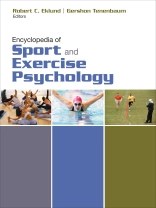How do athletes overcome fears, slumps, mental blocks, or injuries? How do they deal with stress and anxiety, be it from competitors, teammates, audiences, parents, coaches, or themselves? What psychological techniques prove effective in mental training for peak performance, maintaining concentration, motivation, and competitive drive? How can an athlete enhance his or her commitment to a training regimen, or how might the average person better adhere to a program of fitness and exercise? Readers will find answers to these questions and more in the
Encyclopedia of Sport and Exercise Psychology.
Features & Benefits:
- Entries explore the theory, research, and application of psychology as it relates to sport and fitness in a manner that is accessible and jargon-free to help readers better understand human behavior in sport and exercise settings.
- From personal factors to situational factors influencing performance to specific psychological techniques for enhancing performance, this work provides comprehensive coverage of the field via approximately 350 to 400 signed entries.
- Entries conclude with cross-references and suggestions for further readings to guide students further in their research journey.
Available in print and online, this monumental work is edited by two leading figures in the field with a distinguished international Editorial Advisory Board to select and assign entries, ensuring authoritative content readers can trust.
Key Themes:
- Career Transition
- Certification, Credentialing, and Roles of Sport and Exercise Psychologists
- Disability
- Emotion
- Exercise Health
- Group Dynamics
- History and Foundation
- Leadership
- Morality, Aggression, and Ethics in Sport
- Motivation
- Motor Control
- Perception and Cognition in Sport
- Personality and Psychological Characteristics in Sport
- Psychobiology
- Psychological Skills/Interventions
- Psychosociocultural
- Self-Concept/Self-Perceptions, and Identity
- Youth Sport
Sobre el autor
Gershon Tenenbaum, Ph D, is Benjamin S. Bloom Professor of Educational Psychology and Professor of Sport and Exercise Psychology at Florida State University. He is a former director of the Ribstein Center for Research and Sport Medicine at the Wingate Institute in Israel, and coordinator of the graduate program in sport psychology at the University of Southern Queensland, Australia. From 1997 to 2001 he was President of the International Society of Sport Psychology, and from1996–2008 served as Editor of the International Journal of Sport and Exercise Psychology. He has published extensively in psychology and sport psychology in the areas of expertise and decision making; linking emotions, cognitions, and motor systems; psychometrics; and coping with physical effort experiences. Dr. Tenenbaum has written and edited several books. In 2012 he edited Measurement in Sport and Exercise Psychology (with Robert C. Eklund and Akihito Kamata); Case Studies in Applied Psychophysiology: Neurofeedback and Biofeedback Treatments for Advances in Human Performance (with William A. Edmonds), and the Handbook of Sport Psychology, 3rd Edition (with Robert C. Eklund). Dr. Tenenbaum has received several awards for his academic and scientific achievements, such as the Distinguished Scientific and Research Contributions to Exercise and Sport Psychology Award from the American Psychological Association, Division 47–Exercise and Sport Psychology, The International Society of Sport Psychology (ISSP) Presidential Award, The ISSP Honor Award, The ISSP Distinguished International Scholar Award, and the Journal of Educational Research’s Harold E. Mitzel Award for Meritorious Contribution to Educational Practice through Research. He is a member of several professional organizations and a fellow of the American Psychological Association (Division 47), Association for the Advancement of Applied Sport Psychology, and the American Academy of Kinesiology. Dr. Tenenbaum is a scientific advisor to the Israeli Olympic Committee and has been invited to lecture in many conferences and for organizations worldwide.












